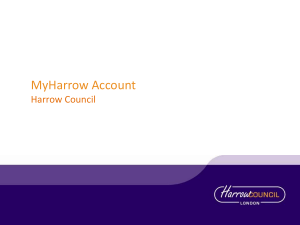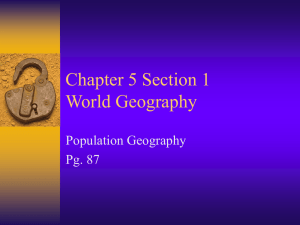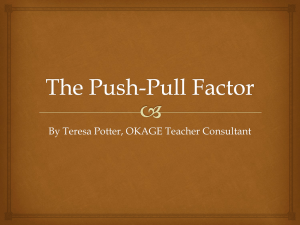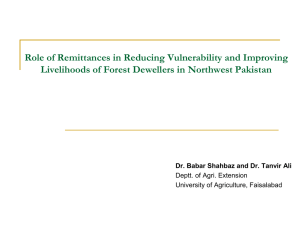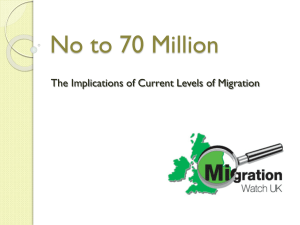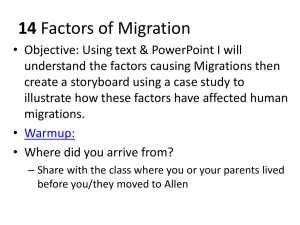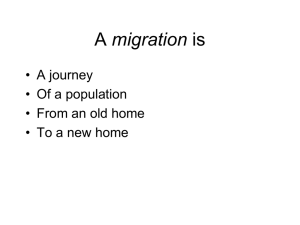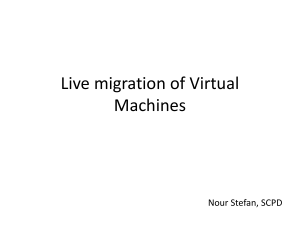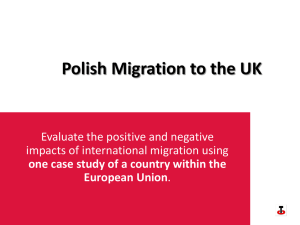eERDMS - MER Conference
advertisement
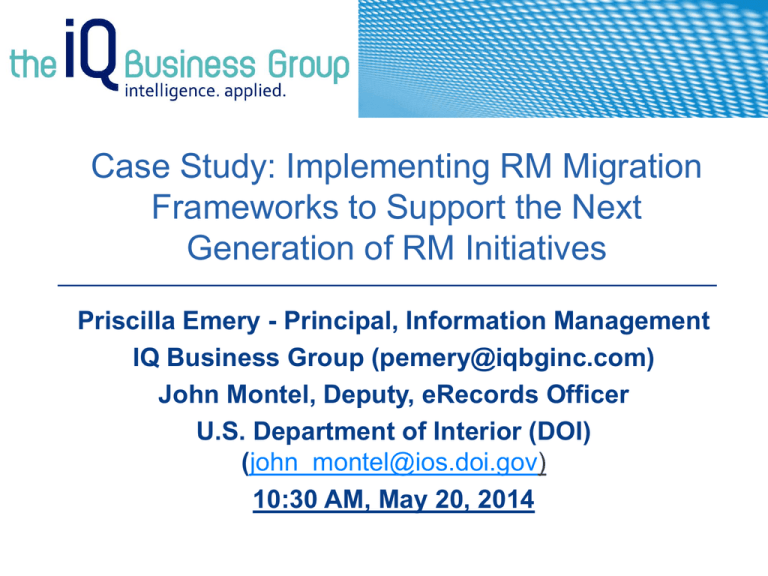
Case Study: Implementing RM Migration Frameworks to Support the Next Generation of RM Initiatives Priscilla Emery - Principal, Information Management IQ Business Group (pemery@iqbginc.com) John Montel, Deputy, eRecords Officer U.S. Department of Interior (DOI) (john_montel@ios.doi.gov) 10:30 AM, May 20, 2014 Session Objectives At the end of this session you will understand: • The different reasons an enterprise may need to consider • • • • migration to a different RIM system and specifically DOI’s RIM strategy and how migration fits into its overall objectives, DOI’s experience thus far with using the framework and migrating its previous systems to the new platform The different components of a standards-based framework to size, scope and budget for a migration project providing examples and details that must not be ignored during the planning process, The lessons learned during the course of using the framework When migration makes sense and when it doesn’t. Agenda • Reasons to Consider RM Migration • DOI eERDMS Project Background • Development of Migration Framework • Framework in Practice • Lessons Learned • Details of Migration Framework Components Reasons an Organization Might Consider an RM Migration? • Second and Third Generation Systems need to be refined • Take advantage of new features / functions not available in present system • Present system no longer supported by vendor • Organizational Recognition That Standardization Needs to Take Place • Too many different systems to support • Searching across systems has become almost impossible to accomplish • Lack of Information Governance, i.e., 100s of SharePoint sites with no standard classification or poorly integrated. • Part of a Digital Preservation Strategy The Common Denominator? • Migrations tend to be IT driven • Can be a hard sell to users • Need to make sure impacts to business activity are positive. • Integrity of old system needs to be quickly understood • Consistency of classification • Consistency of file structure • Consistency of disposition practice What is the Department of the Interior? Protects America’s natural resources and heritage, honors our cultures and tribal communities, and supplies the energy to power our future • ~80,000 employees • $16.8B operation budget • 500M acres of surface land • 479 dams and 348 reservoirs • 30% nation’s energy production • 55,000 different maps each year • ~500M visitors • 1 in 5 acres of land managed Program Vision eERDMS will provide the Department with an single enterprise records management solution for the capture, preservation and management of electronic and paper-based records. eERDMS will identify, capture, preserve and accession records associated with all inbound and outbound email, forms, reports, documents, and other Departmental record assets so that the Department will have effective access and management of all records. What is eERDMS ? • eMail, Enterprise Records and Document Management Solution • Serves Office and Bureau records associated areas, such as: • Records • Forms • Privacy • Section 508 • and Controlled Unclassified Information (CUI). • Provides a single enterprise cohesive records management environment Components of eERDMS • Enterprise eArchive System (EES) captures, journals, and stores all electronic correspondence • Enterprise Content System (ECS) stores all electronic content like social media, project files, websites • Enterprise Forms System (EFS) automates and standardizes all internal/external forms • Enterprise Dashboard System (EDS) centralizes data, metrics, reporting, and trend analytics on demand to know and manage large amounts of information 10 Enterprise eArchive System (EES) • Will provide the Department with an enterprise records and document management solution for all email and other electronic correspondence. • Will be comprised of a Department of Defense (DOD) 5015.2 certified records management module. • Will centralize the Departments’ records program and provide a single cohesive records management environment. • Will begin with the journaling of all email correspondence, and expand to encompass the capture of all documents in an electronic format. Enterprise Content System (ECS) • Will capture records related to electronic documents, contents in social media, mobile media, internal Department websites, and other common correspondence into the EES records management component. • Will follow EES and will enable the analysis and management of the data captured electronically for improved management decisions and information sharing/retention Benefits of eERDMS 12 DOI Management • Improved decision making using enterprise wide data • Improved data and trend analysis • Improved workflow/workload projections • Reduction of paper storage capacity and associated costs • Elimination of redundant electronic recordkeeping systems • Reduce administrative costs and enable management to focus more on mission related efforts. Benefits of eERDMS DOI Operations: • Elimination of “Print and File” Requirement (Starting with Email) • Elimination of redundant electronic recordkeeping systems • Improved search capability across the Department • Traceable workflow for all records • Simplify and reduce administrative record retentions • Reduce redundancy in duplicate copies of records across DOI Why eERDMS? • November 2011 President Obama called for: • “…executive branch wide effort to reform records management…” • Develop a framework to manage records ensuring open Government • Leverage information across DOI to improve performance • Reduce unnecessary costs and burdens to focus on mission critical functions. • eERDMS is the program that will implement the policies, processes and technology to sustain this framework. Objectives of Migration • Comply with Presidential Directive on Managing Government Records • Using a cloud-based approach • Migrate permanent records to an electronic platform • Provide a standard yet flexible platform for the Department to support: • Exponential growth and use of electronic records, including e-mail • Economies of scale inherent with the use of a standard platform • Specific objectives may be different depending on the agency or bureau Migration Scenarios Can Vary • Older RM system to eERDMS • When looking at the need to upgrade a system in place does it make sense to migrate? • Manual process to eERDMS • When there is no ECM system in place does it make sense to migrate manual procedures to eERDMS? • Paper Repository to eERDMS • Does it make sense to do a backfile conversion? • Does the physical records management system in place still meet the needs of the bureau / agency? • These days it’s not just paper or electronic – it’s both • Need to consider using one tool • In all cases, if these are really forms-based processes need to look at migrating to Electronic Forms System (EFS) Developing a Migration Framework • To define a repeatable process and framework for the migration of legacy ECM systems to the newly defined standard ECM system. • Framework of standard, yet flexible questions that need to be answered so that the scope of each migration can be ascertained. • Objective of gathering information is to be able to intelligently estimate level of effort (LOE), capabilities required, sizing, and cost of migration effort. • Framework used based on ISO standards and past experience migrating systems. Migration Project Steps • Discovery • Gather information through set of standard questions and interviews • Analysis and Estimation • Review information gathered and produce an analysis report that can aid in the development of project functional specifications and cost estimation. • Go / No Go • Decide whether or not the cost and effort to migrate is justified • Design and Implement • Develop detailed functional specification, software requirements, staffing and project plan. • Production Rollout • Implement Framework in Practice • Guided interview process – not just a questionnaire to throw out to users • There was a concern there were TOO many questions being asked. • Framework developed with a modular fashion • Not all sections of questionnaire are relevant to each migration so need to pick and choose. • It’s not all about the technology • Need to understand environments such as satisfaction with current system, usability, etc. • Several review cycles needed to make sure all information is gathered accurately • Analysis reports need to be reviewed closely by all parties – this is what the estimates and designs will be based on. Migration Governance • Prioritizing which agencies and systems get migrated and at what time. • This is both a political and technical decision • Tracking migrations and communicating status Lessons Learned • It’s not enough to just ask questions • A real demo of system to be migrated is required. • E.g. DMU document capture process • Understanding the core operation and process is key to overall success • It’s not just a matter of moving files from one system to another • Document capture highly impacts records search and retrieval. • Sometimes the first technical solution doesn’t provide the best fit. Advantages of Using a Migration Framework • Apply consistent evaluation process against all migration • • • • activities (perception of fairness) Minimizes “surprises” during migration process (completeness of analysis at beginning) Helps to document justification for migration Serves as jumping off point for developing migration project plan Even when moving from different vendor systems to one system you have a standard approach for estimating effort Challenges and How to Address Them • Some groups are anxious to migrate and some want no part of it. • Look for the opportunities where real improvements can be made and groups are up for the challenge • Migrating active systems • Need to put a stake in the ground for when the old system should stop being changed and files no longer accepted. • Too soon and you run the risk of creating a huge backlog • Too late and you run the risk of leaving out files or changes. • The timing of training new users • Too soon and they lose interest • Too late and they feel overwhelmed. • Stage different levels of training over the course of the project. Framework Components • Discovery • Modular set of questions covering: • • • • • • • • • • • • • • Basic System Information Capture / Ingestion Performance, Sizing and Volume Document Taxonomy / Organization / Indexing Records Management Imaging System Features Document Management System Reporting and Auditing Other System Interfaces Security Discovery and Audit Response Shared Drives System and Document Handling Expenses Business Environment / Outstanding Issues Analysis • Starting point for functional specifications • Assess present situation and map to new environment • Account for anomalies / challenges and identify approach • • • • to address them Scope level of effort (people, time, etc.) Identify all software and hardware requirements Address reusability (or not) of present components (hardware, networks, etc.) Estimate costs based on above information Go / No Go • What elements justify a go / no go decision? • Different for each organization. • ROI • Standardization • Timing – Good or Bad • Official Mandate • Vendor no longer supports product – dead in the water if you don’t do something Implementation • Dealing with “moving parts” • Putting a stake in the ground for when updates need to stop on old system • Putting a stake in the ground for which version of retention schedules will be migrated. Major Issues to Consider When Migrating RM • Links to Legacy Applications need to be maintained • Documents under Hold need to be reviewed before migration. • “Do No Harm” i.e. Don’t give people less than they already have. • Make sure retention levels are maintained – not necessarily reset • This can be trickier than it sounds • Sometimes old classifications and naming practices don’t make sense to carry over. • Training, training, training • John Montel • eRecords Service Manager • Service Planning and Management • Department of the Interior • Office of the Chief Information Officer • 1849 C. Street, N.W., Room 7444 • Washington, DC. 20040 • T. (202) 208-3939 • E. john_montel@ios.doi.gov Priscilla Emery E-Mail: pemery@iqbginc.com www.iqbginc.com
